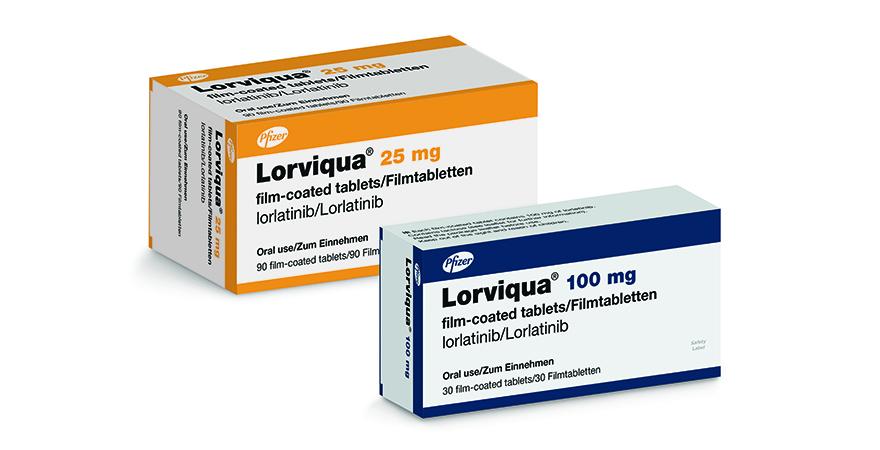Lorviqua (lorlatinib) vs Krazati (adagrasib)
Lorviqua (lorlatinib) vs Krazati (adagrasib)
Lorviqua (lorlatinib) and Krazati (adagrasib) are both targeted therapies used to treat non-small cell lung cancer (NSCLC) with specific genetic mutations. Lorviqua is a third-generation anaplastic lymphoma kinase (ALK) inhibitor designed to treat patients with ALK-positive metastatic NSCLC, particularly those who have progressed on prior ALK inhibitors. Krazati, on the other hand, is a KRAS G12C inhibitor indicated for the treatment of adults with KRAS G12C-mutated locally advanced or metastatic NSCLC, as determined by an FDA-approved test, who have received at least one prior systemic therapy. The choice between these two medications would depend on the patient's specific genetic mutation; therefore, genetic testing is essential to determine the most appropriate treatment.
Difference between Lorviqua and Krazati
| Metric | Lorviqua (lorlatinib) | Krazati (adagrasib) |
|---|---|---|
| Generic name | lorlatinib | adagrasib |
| Indications | ALK-positive metastatic non-small cell lung cancer (NSCLC) | KRAS G12C-mutated locally advanced or metastatic NSCLC |
| Mechanism of action | ALK and ROS1 tyrosine kinase inhibitor | KRAS G12C inhibitor |
| Brand names | Lorviqua | Krazati |
| Administrative route | Oral | Oral |
| Side effects | Edema, peripheral neuropathy, cognitive effects, dyspnea, weight gain | Nausea, diarrhea, fatigue, liver enzyme elevation |
| Contraindications | Hypersensitivity to lorlatinib | Hypersensitivity to adagrasib |
| Drug class | Tyrosine kinase inhibitor | KRAS inhibitor |
| Manufacturer | Pfizer | Mirati Therapeutics |
Efficacy
Lorviqua (Lorlatinib) Efficacy in Lung Cancer
Lorviqua, also known by its generic name lorlatinib, is a medication that has been approved for the treatment of certain types of lung cancer. Specifically, it is indicated for patients with anaplastic lymphoma kinase (ALK)-positive metastatic non-small cell lung cancer (NSCLC) who have progressed on prior ALK inhibitors. Lorlatinib is a third-generation ALK tyrosine kinase inhibitor (TKI) designed to penetrate the blood-brain barrier, which provides efficacy against both systemic and central nervous system (CNS) disease. Clinical trials have demonstrated that lorlatinib has significant activity in patients with ALK-positive NSCLC, including those with CNS metastases and those who have become resistant to earlier-generation ALK TKIs.
The efficacy of Lorviqua was evaluated in a non-randomized, dose-ranging and activity-estimating, multi-cohort, multicenter study. The results showed a substantial number of patients achieving objective response rates, with some experiencing durable responses. The drug has been particularly noted for its ability to manage and control CNS metastases, which is a common complication of ALK-positive NSCLC. The duration of response and progression-free survival rates have been promising, positioning lorlatinib as a valuable treatment option for patients with advanced ALK-positive NSCLC.
Krazati (Adagrasib) Efficacy in Lung Cancer
Krazati, with the generic name adagrasib, is a newer medication that targets a specific mutation in the KRAS gene known as KRAS G12C. This mutation is present in a subset of non-small cell lung cancers and has historically been difficult to target with therapies. Adagrasib is designed to irreversibly and selectively bind to the KRAS G12C mutant protein, thereby inhibiting its function and downstream signaling pathways that promote tumor growth. While this medication is still under clinical investigation, early data from trials have shown promising efficacy in patients with KRAS G12C-mutated NSCLC.
Initial clinical trial results for Krazati have indicated a significant objective response rate in patients with advanced NSCLC harboring the KRAS G12C mutation. The responses observed in the trials were also durable for many patients, with a median duration of response that supports the potential of adagrasib as an effective treatment for this challenging target. The drug has shown activity in both previously treated patients and those who are treatment-naïve, suggesting its potential utility in various lines of therapy for KRAS G12C-mutated NSCLC. As research continues, adagrasib may become an important addition to the arsenal of targeted therapies for lung cancer.
Regulatory Agency Approvals
Lorviqua
-
European Medical Agency (EMA), European Union

-
Food and Drug Administration (FDA), USA

-
Health Canada

-
Therapeutic Goods Administration (TGA), Australia

Krazati
-
European Medical Agency (EMA), European Union

-
Food and Drug Administration (FDA), USA

Access Lorviqua or Krazati today
If Lorviqua or Krazati are not approved or available in your country (e.g. due to supply issues), you can access them via Everyone.org.
How it works

Make an enquiry
Choose the medicine you want to buy, answer a couple of questions, and upload your prescription to speed things up. We’ll get back to you within 24 hours.


Make an enquiry
Choose the medicine you want to buy, answer a couple of questions, and upload your prescription to speed things up. We’ll get back to you within 24 hours.


Breeze through the paperwork
We'll guide you through the required documents for importing unapproved medicine, ensuring you have all the necessary information.


Get a personalized quote
We’ll prepare a quote for you, including medicine costs and any shipping, administrative, or import fees that may apply.


Receive your medicine
Accept the quote and we’ll handle the rest - sourcing and safely delivering your medicine.

Some text on this page has been automatically generated. Speak to your physician before you start a new treatment or medication.
Let's talk
If you have any questions, call us or send us a message through WhatsApp or email:
Contact us




